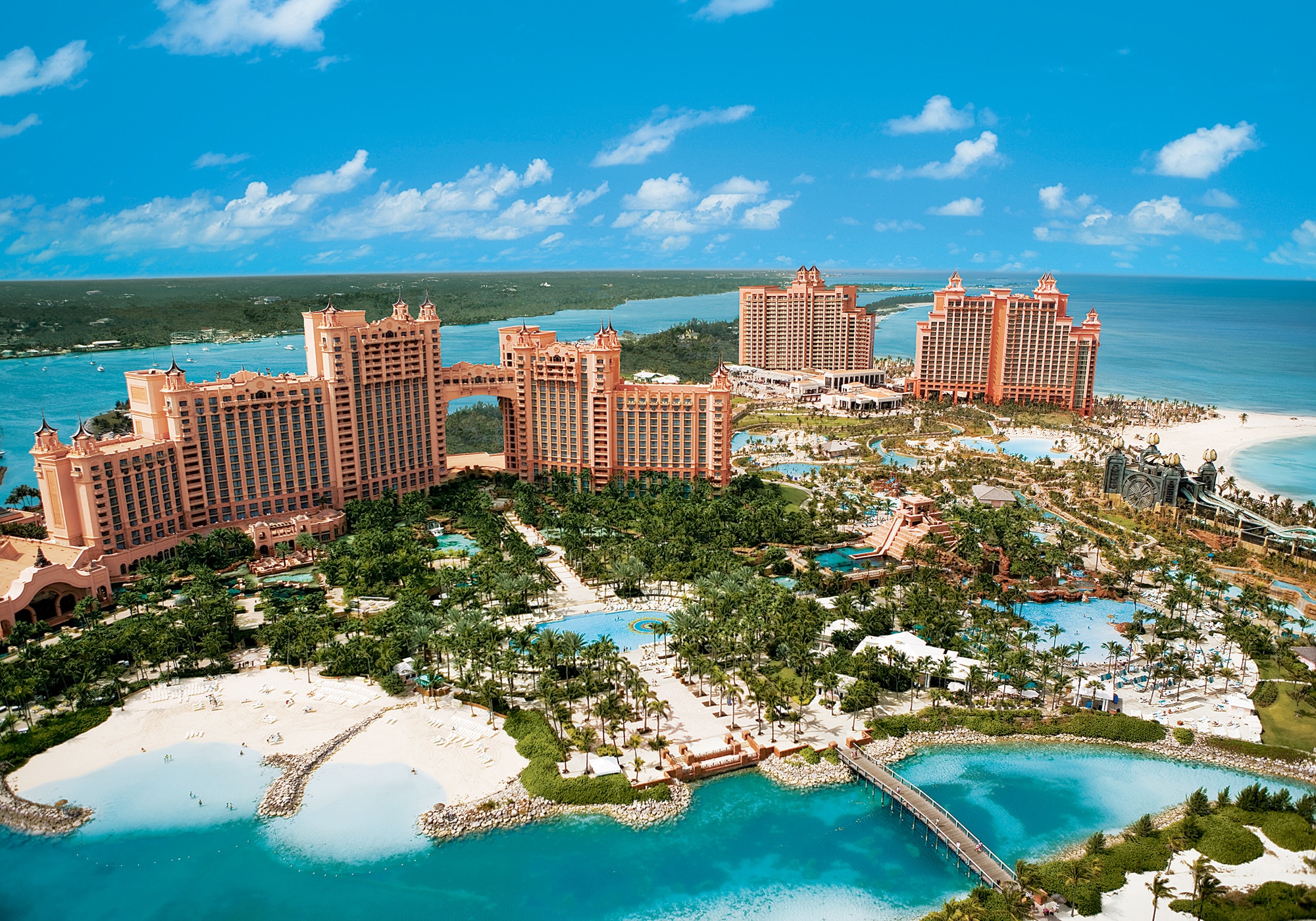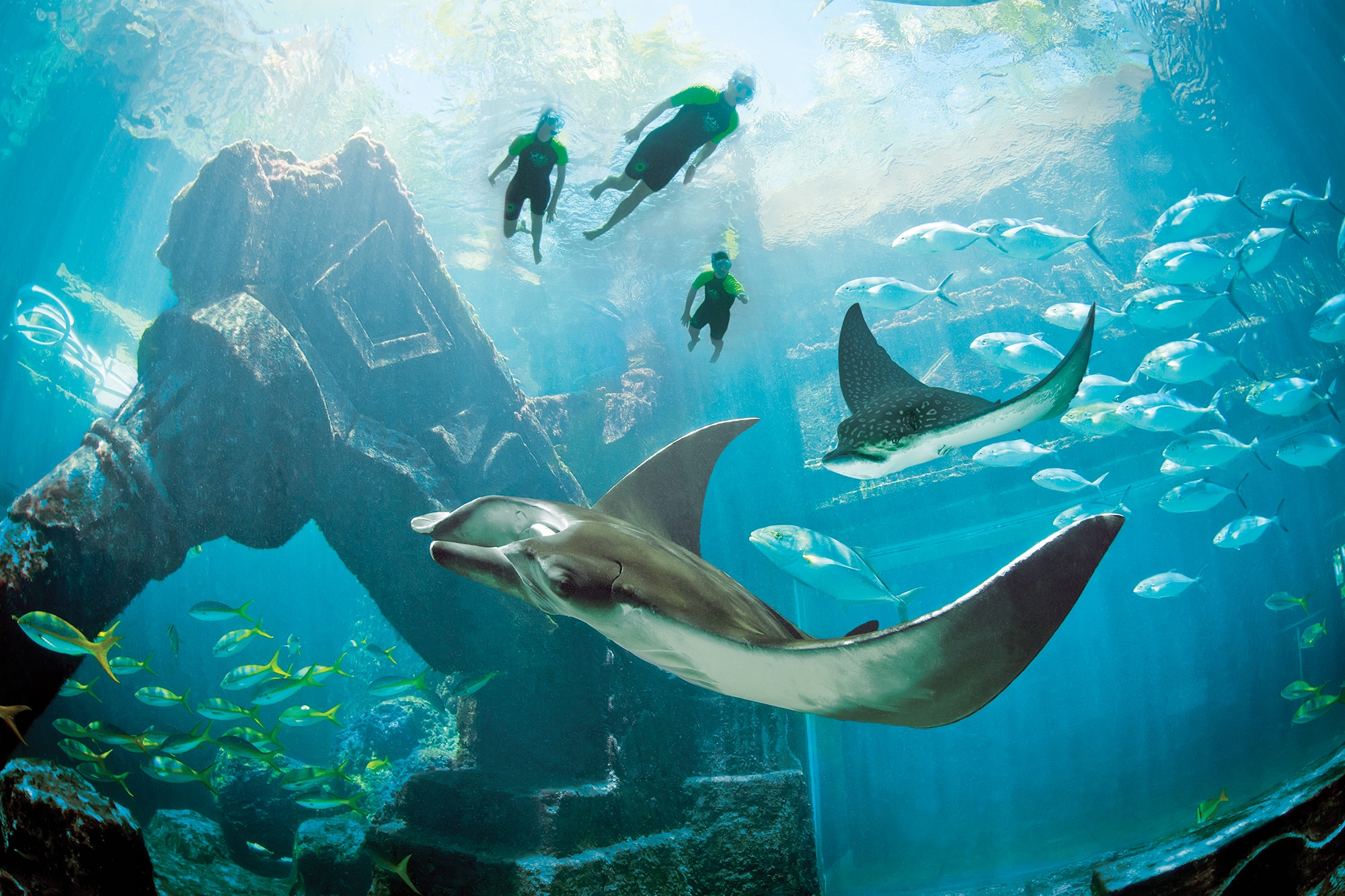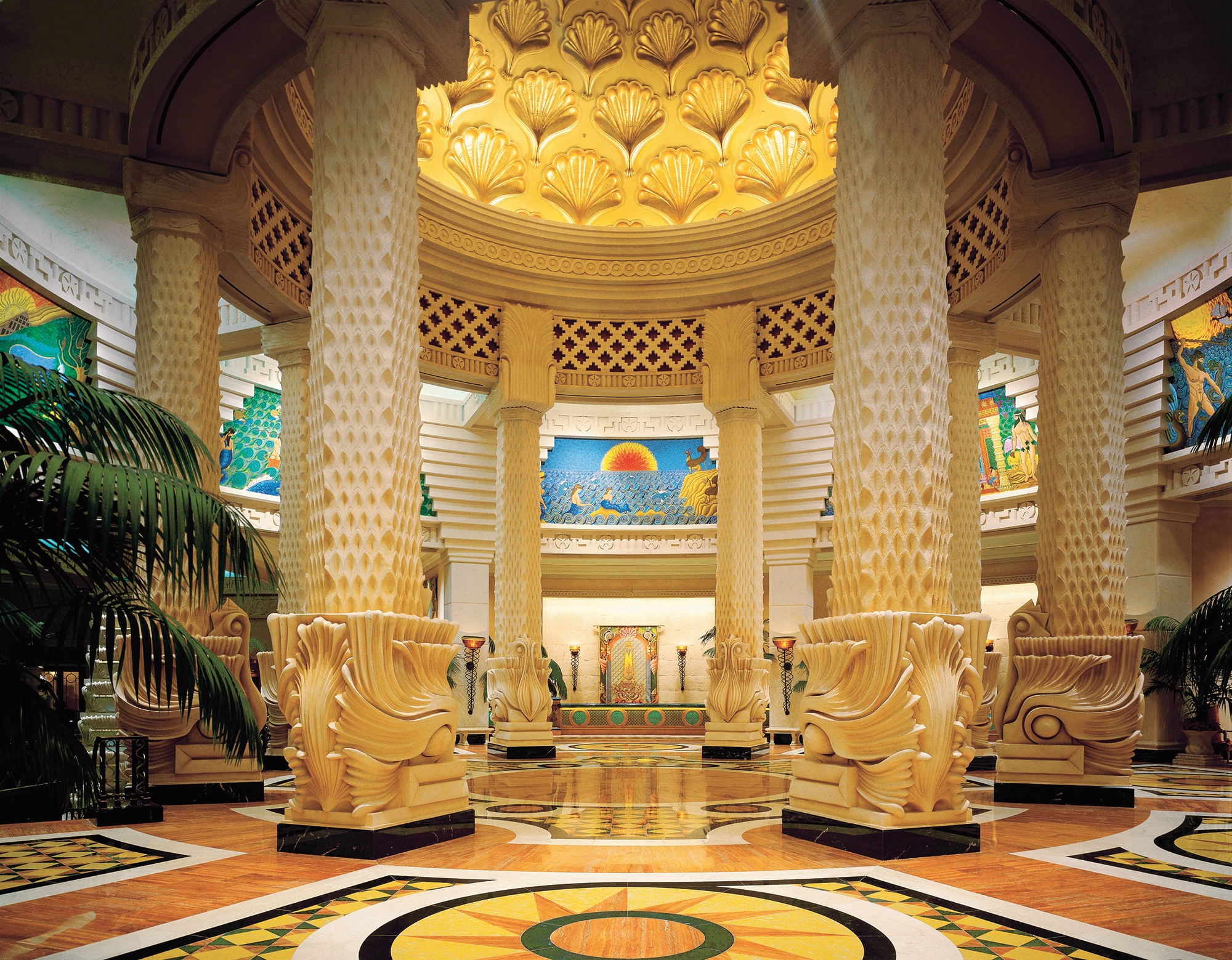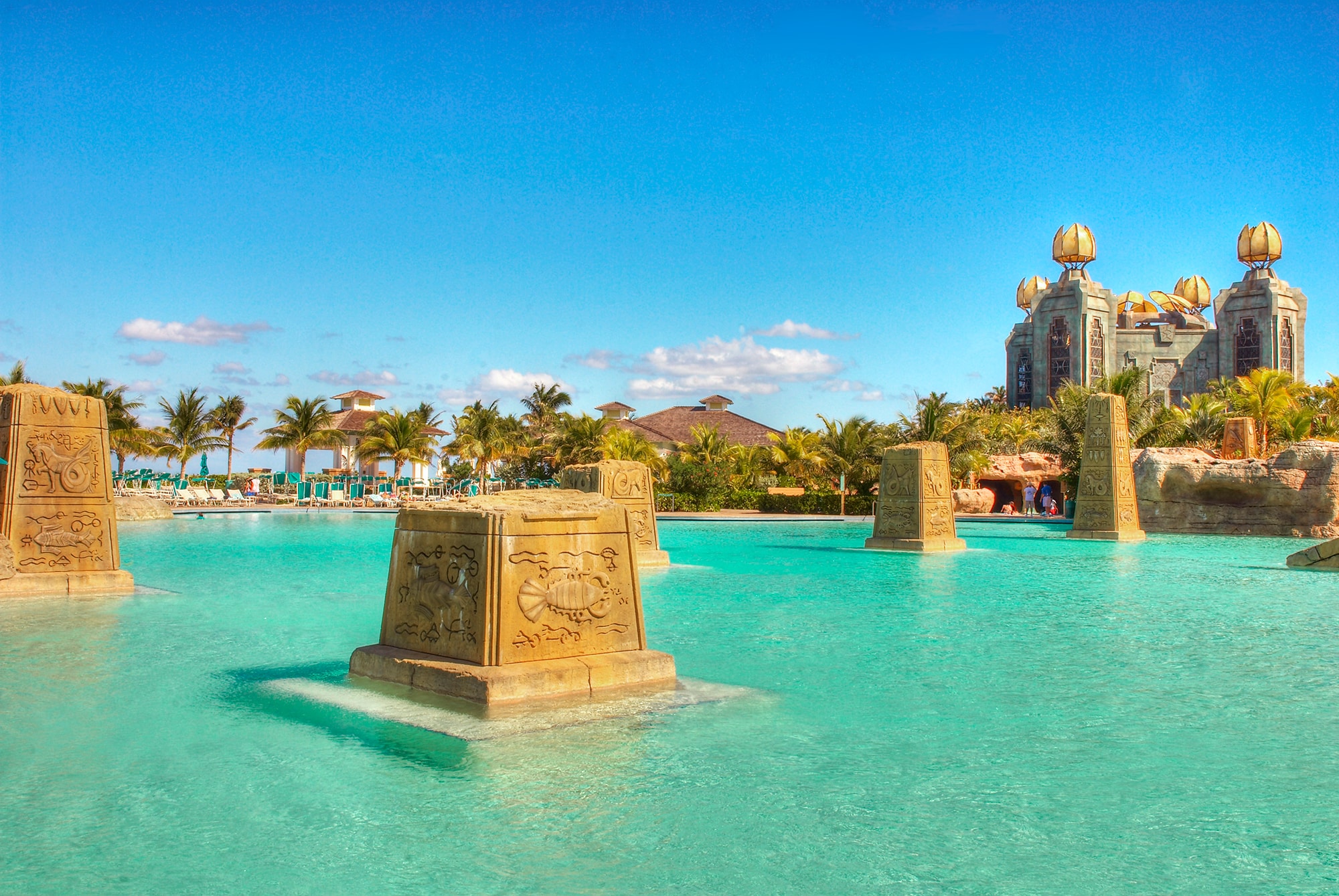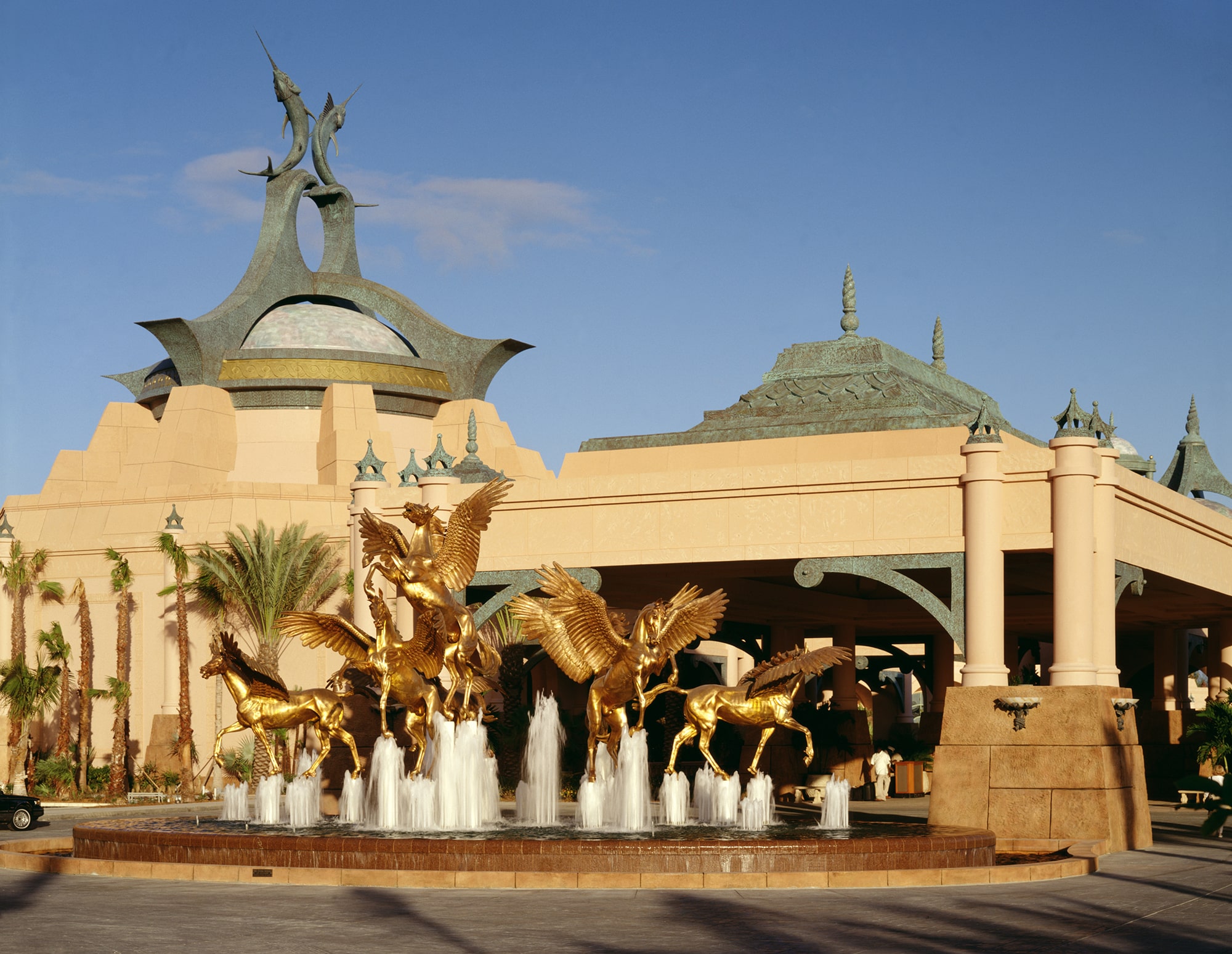What Can Atlantis Resort Teach You About Greek Mythology?
A father and son, both fascinated by ancient Greece, visit the Bahamas resort to find out.
I'm snorkeling over sunken ruins, feeling like a guest on a quiz show.
The $10,000 question: What are the origins of the lost world I'm exploring? Scattered in the depths below are broken marble columns (the remains, perhaps, of temples from classical Greece?), fragments adorned with hieroglyphics (Egypt of the Pharaohs?), an enormous sundial (Maya, anybody?).
Tropical fish and manta rays are elegantly gliding past the monolithic statue of a bull — a relic of Babylon, perhaps? — followed by a very lazy reef shark. Then I spot the "ancient submarine."
"This submarine was made 11,000 years ago from whale bones and mother-of-pearl," the snorkeling guide intones. "It was powered by giant crystals! Atlantis was a highly civilized place, with technology that often exceeded our own," she adds. I look over at my 11-year-old son, Sam, who is weighing up this exotic snippet.
"Well, maybe they're getting a little carried away with the ancient submarine," I suggest.
"It's still cool," he shrugs. Sam knows as well as I do that our destination demands a little flexibility on historical detail.
Our dive site is not in the Mediterranean, lost on some Homeric shore, but in the very modern water park of Atlantis in the Bahamas, dating from the mid-1980s. We're in a huge pool aptly called Ruins Lagoon, which is filled with evocative faux-antiquities.
And as unlikely as it sounds, we've come to Atlantis on a fact-finding mission.
Sam has been obsessed with ancient Greece for years — Jason and the Argonauts, Hercules movies, Percy Jackson books. When he first heard that there was a water park called Atlantis, named after the legendary continent that sank beneath the waves, he begged me to take him there. At first, I resisted his entreaties. But I used to love Greek mythology as a kid too, and as an adult, I have written a couple of books on classical history. Curiosity prevailed. Why not? I decided. Perhaps a visit to Atlantis could actually be ... educational.
And so began a quest worthy of Jason himself: I wanted to see what Sam could learn about ancient mythology from a 21st-century water park.
The moment we arrived, we were swept up by Atlantis' sense of theater. We eagerly spotted the Greek touches: Corinthian columns in the lobby, colorful mosaics of mythical scenes on the ceiling, neoclassical murals in an outdoor restaurant. And as one might have expected of legendary Atlantis, the modern resort dazzles visitors with its scale. Sprawling across 141 acres, its hotel complexes can sleep up to 10,000 people. It's a self-contained world, with connected pools, exotic restaurants, a casino, shopping malls and a cinema. We got lost immediately, inspiring me to wax lyrical about the Greek myth of the Minotaur in its labyrinth, and how the hero Theseus finds his way out of the maze by using a ball of twine to retrace his steps.
It was also quickly obvious that the resort casts its cultural net wide, as we dashed in excitement between waterslides modeled on a six-story Maya temple and a vaguely Egyptian "Power Tower." This inspired my first lesson to Sam, when we retired at dusk to a bar-cafe called Plato's. It was the Greek philosopher Plato who first described Atlantis in the 4th century B.C. (for the record, in two dialogues called Timaeus and Critias). The story of the lost continent has captured the imagination of generations and inspired hundreds of treasure hunters and theories — including the idea that Atlantis stretched from Europe to the Americas and that it influenced cultures from Africa to Mexico. "Of course the Bahamas were part of Atlantis," one of the wait staff helpfully explained, adding that aerial photos seemed to reveal a submerged highway nearby.
Clearly, I could be creative in finding connections to the past. The longer we stayed, the more pagan the resort began to feel.
It resembled raucous Greek athletic festivals like the Olympics, I told Sam, where sunshine and outdoor exercise were first worshipped. We treated the waterslides like mythic challenges — a bit like the Labors of Hercules — each one scarier than the next. We floated in inner tubes around a mile-long river, crashed down terrifying artificial rapids and were carried on conveyor belts up to rides with ominous names like The Drop. We fell through darkness in a whiplash-inducing slide called the Serpent, screaming at the top of our lungs, then were shot in transparent tubes through shark-infested lakes. The ultimate challenge was the Leap of Faith, a 60-foot high, near-vertical plunge that might have turned Hercules' hair white.
But the Greeks also worshipped nature. They loved sea creatures, and Atlantis also has the air of a magical aquarium. We swam with dolphins, companions of the Greek sea god Poseidon, and cavorted with sea lions. In the glittering lakes, we spotted a sawfish skimming across the sands — just the sort of prehistoric creature, when glimpsed from afar, that might have inspired poets to dream of sea monsters.
On our last evening, we returned to Plato's bar-cafe to reflect on our findings. Sam was now ready for the complex truth. The idea of Atlantis has inspired writers for 2,500 years, but there is a reason no one has ever found it: It never existed. The evidence is that Plato invented Atlantis as an ideal society for his own literary purposes so he could expound upon his political theories. This doesn't mean Atlantis was pure fantasy. Many archaeologists argue that the memory of Santorini's massive volcanic eruption in 1640 B.C., which sent destructive tidal waves around the entire Mediterranean, could have inspired Plato's enduring story.
In a sense, every age invents its own Atlantis.
The modern Bahamian resort draws its inspiration less from Plato's dialogues than pop artifacts like the 1961 movie Atlantis, the Lost Continent, which includes the "ancient submarines" we had snorkeled across in Ruins Lagoon. Its cheery embrace of multicultural history, tossing Mexican, European and Middle Eastern imagery into a colorful brew, matches the cosmopolitan makeup of its guests. Even as we sat in Plato's, the air echoed with Spanish, Japanese and Indian tongues. The philosopher would have been proud: The resort Atlantis is a celebration of our global culture, with everyone united in the pursuit of sunshine and fun.
Sam and I pondered this as we found one last inner tube and plunged into the darkness of the Serpent's throat. For Sam, Atlantis was a fair approximation of paradise — or as the Greeks would have it, Elysium. It certainly won't be sinking anytime soon.
Atlantis Travel Info
-
A 30-minute drive from Lynden Pindling International Airport (NAS), Atlantis offers a half-dozen hotel towers. The Reef building is great for families because the condominium rooms all have kitchens and refrigerators.
-
The best restaurants are Virgil's (named not for the Roman poet, but a chain of Texan barbecue) and chef Nobu Matsuhisa's famed Japanese restaurant, Nobu (located inside the casino).
-
History buffs should take a guided snorkel of Ruins Lagoon. Guests walk through The Dig's main tunnels and admire the lagoon's sunken statues through glass windows, but swimming with tropical fish and stingrays is the resort's most distinctive adventure.
